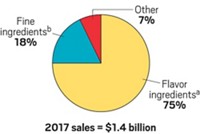Advertisement
Grab your lab coat. Let's get started
Welcome!
Welcome!
Create an account below to get 6 C&EN articles per month, receive newsletters and more - all free.
It seems this is your first time logging in online. Please enter the following information to continue.
As an ACS member you automatically get access to this site. All we need is few more details to create your reading experience.
Not you? Sign in with a different account.
Not you? Sign in with a different account.
ERROR 1
ERROR 1
ERROR 2
ERROR 2
ERROR 2
ERROR 2
ERROR 2
Password and Confirm password must match.
If you have an ACS member number, please enter it here so we can link this account to your membership. (optional)
ERROR 2
ACS values your privacy. By submitting your information, you are gaining access to C&EN and subscribing to our weekly newsletter. We use the information you provide to make your reading experience better, and we will never sell your data to third party members.
Business
Integrating Cognis
To succeed in personal care, BASF looks to link the scientific and the emotional
by Michael McCoy
March 7, 2011
| A version of this story appeared in
Volume 89, Issue 10

In 2008, Gabriel Tanbourgi became head of BASF’s newly created care chemicals division. The 20-year company veteran’s mandate was to merge a fine chemicals operation that made cosmetic ingredients and aroma chemicals with a unit that mainly supplied the cleaning products industry.
As the pieces were integrated and a strategy was hashed out, Tanbourgi could see that BASF was well positioned to supply makers of home and fabric care products with many of the raw materials they need. The business, though, lacked large-volume ingredients on the personal care side, in particular the oleochemical-based surfactants that are the backbone of many cosmetics.
To close this gap, Tanbourgi pushed for an acquisition. He had his eyes on Cognis, a German maker of specialty chemicals that he considered number one in the personal care industry. BASF got ready to make a move. Then the recession hit, and dealmaking was put on hold.
The deal was reactivated in 2010 after Tanbourgi had steered his organization through the economic crisis. In June, BASF announced the acquisition of Cognis for roughly $4 billion, including debt and pension obligations. The deal was completed in December.
Now, Tanbourgi and his colleagues have an even bigger integration task ahead of them. The majority of Cognis’ $3.2 billion in annual sales will be folded into the care chemicals division. But just as important as operational integration, Tanbourgi and his team need to mesh a business that serves the emotion-driven cosmetics industry with BASF’s more science-oriented culture.
Successfully integrating the two corporate cultures and business models will be vital for BASF, says Gillian S. Morris, a director at consulting firm Kline & Co. who follows the personal care industry. “Personal care is a different animal from a business like paints and coatings, and there’s a different way of interacting with customers and marketing products,” she says.
BASF, after all, brands itself austerely as The Chemical Company. Cognis, in contrast, has been promoting a concept of well-being it calls Feelosophy. BASF employs eco-efficiency analysis to decide whether a product is environmentally sound. Cognis supplies exotic botanical extracts for high-end lotions and shampoos because that’s what consumers want.
Preserving what made Cognis successful will be crucial for BASF, Tanbourgi acknowledges. “It doesn’t come naturally,” he says of Cognis’ emphasis on consumer experience. “In personal care, we were selling ingredients. Cognis was selling concepts.”
Although Tanbourgi respects Cognis’ approach to the market, the merged personal care organization won’t include the Cognis name, he confirms, and Feelosophy may or may not stick around. “If you ask me in one year, ‘Where is Feelosophy?’ it might not be there. I don’t know. But the spirit will still be there,” he says.
To move the combined business forward, Tanbourgi will rely on people like Dirk Büngel, who was Cognis’ vice president for North America and is now senior vice president of BASF’s care chemicals business in the region.
Integrating Cognis into BASF will be smoothest in the home care market, where BASF already knows how to serve customers seeking optimal product performance, Büngel explains. Performance is also important in the personal care market, but layered on top of it are image and feel. “With a shirt, you ask if it’s clean and white,” Tanbourgi says. “With a shampoo, you ask, ‘How do I feel?’ and ‘How does my hair feel?’ ”
Tanbourgi and Büngel point to sun care as an example of a market where the BASF and Cognis portfolios will mesh well. BASF is a leader in active ingredients that block the sun’s harmful ultraviolet A and B rays, whereas Cognis is an expert in the emollients and emulsifiers that give skin care products their special feel.
“We can prove that an ingredient stops UVA,” Tanbourgi observes. “But if you put a cream on your face and it doesn’t feel right, it doesn’t matter if it provides sun protection.”
Realizing synergy between BASF and Cognis ingredients will be the job of the scientists who have come together after the acquisition, Tanbourgi says. He notes that innovations emerged from the joining of BASF and Ciba—the company’s last big acquisition—such as the Ciba home care R&D project that finally succeeded when BASF polymer chemistry was brought to bear on it.
Although the Cognis integration is still in its early days, Tanbourgi is optimistic that similar synergies will be found as scientists from the two firms start working together. “We recently had a one-week workshop, and at the end of it I couldn’t say who was with Cognis and who was with BASF,” he recalls.
Likewise, Kline’s Morris thinks BASF will ultimately succeed in bringing the pieces together without stifling what made Cognis work. As evidence, she notes a small cosmetic ingredients business that came with BASF’s 2006 acquisition of Engelhard. Renamed BASF Beauty Care Solutions and then left pretty much alone, it has grown by pursuing a solutions-based approach similar to the one Cognis employs, she says.
“BASF is smart enough to know that they can learn from Cognis,” Morris says. “I think they will become a really strong force to contend with in personal care.”





Join the conversation
Contact the reporter
Submit a Letter to the Editor for publication
Engage with us on Twitter